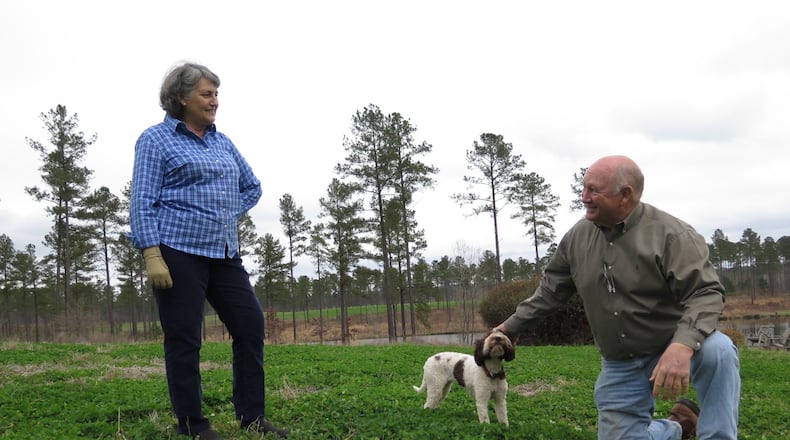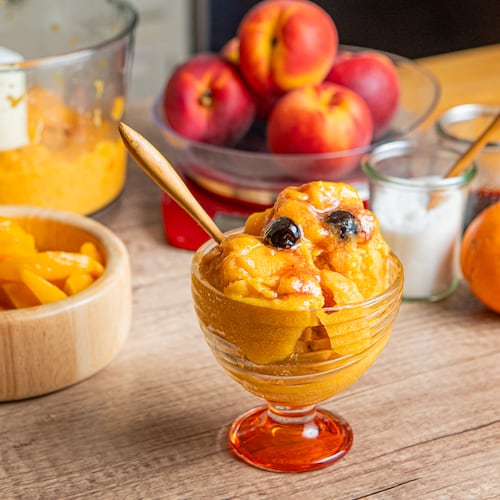Georgia is known for growing many crops, like peanuts, pecans and pine products. And if some people in the state have their way, another product may someday join that list: truffles.
There are hundreds of species of truffles — the fungi that grow in tree root systems — but only a handful have culinary value. One of those, the famed black Périgord truffle, fetches $800-$900 per pound and much of the global supply comes from trees deliberately inoculated with truffle spores.
Experts say the soil and climate of North Georgia echo that of the Périgord region of France, making it an ideal place to try out the challenging crop. In South Georgia, by comparison, a lesser-known species is likely already in full supply. It’s just a question of unearthing them.
George and Beth Thornton are two hopeful Périgord truffle growers. The native Georgians planted more than 1,000 truffle-inoculated trees in 2012 between properties in Elbert County and Edgefield, S.C., where they live.
Truffles are best harvested by scent, usually thanks to a specially trained dog. The Thorntons are training their Lagotto Romagnolo puppy, Sophie, for that purpose. Her breed has been sniffing truffles in Europe for centuries.
The Thorntons will have an inaugural truffle hunt this coming winter but are under no illusions about the risk they took on with the venture.
“You need a lot of patience, and you need to be able to invest the money and consider it gone,” said Beth Thornton. “I really think we will get truffles, but if we were depending on it to eat today, we would be in trouble. It would take the fun out of it.”
George Thornton spent more than three decades in the agrochemical business and was attracted to the agricultural challenge of growing truffles. “I wanted to see if I could do it,” he said. “Anybody can grow apples or peaches.”
He said they set aside a quarter million dollars for the project that he calls “a good part art, a good part science.”
“There are easier investments if you’re just looking for a place to put your money,” said Beth Thornton.
By comparison, south of Georgia’s fall line, a native truffle species is already growing, though it has largely gone unharvested. Unlike its more expensive black Périgord cousin, the pecan truffle has flown under the radar.
Georgia is the largest producer of pecans in the country. That means it could very well be the largest producer of pecan truffles, which sell for $200-$500 per pound.
Tim Brenneman is a plant pathologist at the University of Georgia Tifton campus who first discovered and identified Georgia's pecan truffles near Albany in the late 1980s. He approximated more than half of Georgian pecan growers have some truffles under their trees, whether they are aware of it or not.
He hopes his research will help growers capitalize on a crop they may already have, as well as find ways to cultivate pecan truffles in areas without native growth.
“It’s like any enterprise. The more research and technology is focused on it, the better you get at doing it, and the more efficient and productive the system becomes,” he said. “Then you develop consistent supplies.”
In March, they planted about 80 truffle-inoculated pecan trees at the University of Georgia extension orchard. While they will use them for pecan disease research, researchers will also experiment with and monitor their truffle production.
“There’s a lot that goes into growing truffles and that’s one reason why they’re so rare and so valuable,” Brenneman said. “It’s not something that just happens overnight.”
He said he has sourced and sent pecan truffles to chefs around the country interested in the product.
“There’s no doubt in my mind the markets are there. People want to buy this,” he said. “The limiting factor has just been the consistent supply.” Only a handful of growers are spending any time at all looking for and selling truffles, he said.
Ancil Jacques is a mushroom grower in Reidsville who forages for truffles in pecan orchards and sells them to upscale restaurants. He splits the profits with pecan farmers.
The market is largely untapped, he said.
“Not enough people are taking advantage of it for me to have seen competition yet,” he said.
Given the maturity of Georgia’s pecan trees, he finds many truffles with his eyes, as they emerge from the ground. He is now training a dog, which should accelerate harvest numbers.
Dan Snyder of the Halyards Restaurant Group on St. Simons Island is one regular pecan truffle buyer. He said while his customers are usually unfamiliar with the product, it goes down well, especially given its local origins.
“You put it up against a Périgord, and it’s different. It’s not as pungent. But for the value and the price, it’s a good product. We were a little skeptical when we first tried it, but it’s good stuff.”
Rob and Eric Cohen of Pecan Ridge Plantation in Bainbridge took a risk by investing in a truffle dog a few years ago before knowing they even had any truffles. They now find around 25 to 30 pounds per year and market pecan truffle harvest excursions.
Clint Ray has also spotted the opportunity.
He has been in the pecan business for two decades in Nashville, about 25 miles southeast of Tifton. This fall he found about two pounds of truffles, both loose on the ground and with the help of a hired truffle dog. Now he has his own dog in training and has reached out to chefs to discuss leasing the truffle rights to other growers’ properties.
He said most growers are not generally interested in the unfamiliar crop, especially given the all-time high price for pecans right now.
“Nobody’s interested enough right yet. I don’t think they will be until somebody is actually making money,” Ray said. He hopes to be that person.
About the Author
The Latest
Featured




